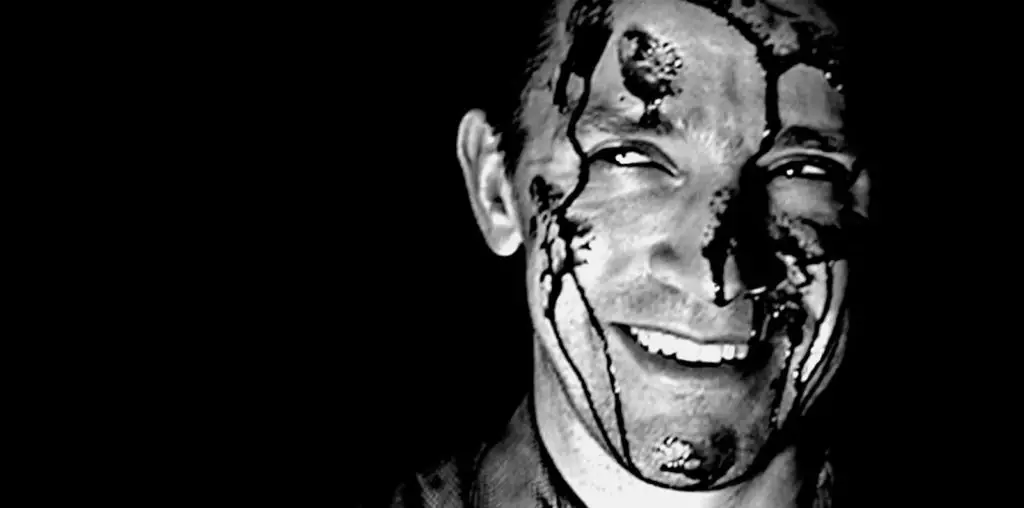
Like a newspaper deliveryman lobbing the New York Times onto a cement sidewalk, “Man Push Cart” dumps us onto the pre-dawn streets of Manhattan. Director Ramin Bahrani captures the crisp, vivid subculture of street-sweepers, garbage men, magazine kiosk clerks, and other immigrant pavement-pounders who awaken the Big Apple before rush hour. We can almost feel the misty spray of water that shoots from a street-cleaner’s hose. Grabbing greenbacks in exchange for his shady wares, a peddler of bootleg porno DVD’s huddles in the dark with early rising customers.
Meanwhile, a tormented Pakistani named Ahmad (Ahmad Razvi) sells coffee and donuts from a silver pushcart. We follow this longhaired brunette’s humble, lonely routine, as he hawks his wares in front of garish department store window displays and illuminated Christmas trees. Greedy, frantic fingers hand over coins, then grab morning snacks. Occasionally, someone might offer this enigmatic food vendor a “Good morning.” On other, less hospitable occasions, passers-by might accuse him of being a terrorist.
“Man Push Cart” slowly, insidiously throws us tiny nuggets of insight concerning Ahmad’s tragic past. For reasons not clearly explained, we learn of his migration to the Big Apple from Lahore, with a wife and young son in tow. We discover that Ahmad’s wife has died, and that her parents have custody of his child. The in-laws harbor hostile feelings towards Ahmad.
Later in the film, a wealthy Pakistani named Mohammad (Charles Daniel Sandoval) recognizes Ahmad as a one-time rock star – “The Bono of Lahore,” he exclaims. This affluent businessman becomes a friend, offering work to Ahmad, as well as the promise to revive his music-making career. Romantic possibilities develop when Ahmad meets Noemi (rising star Leticia Dolera, of “Semen: A Love Story”), a perky Spanish magazine vendor working in her uncle’s nearby retail hut,.
Unfortunately, Ahmad’s baggage-laden past has created a defensive, wary armor impervious to new relationships. Will Ahmad respond to Noemi’s advances? Will he team up with Mohammed and resurface as a musical force to be reckoned with? Don’t bet on it. With weighty emotional force, “Man Push Cart” leaves us to ponder what has transformed this tattered, desperate man from riches to rags.
For better or worse, Bahrani provides few clues. Why does Ahmad resist the opportunity to cash in on Ahmad’s promise of a rock-career resurgence? What circumstances resulted in the death of his spouse? And what’s with the rocky relationship between Ahmad and his unforgiving in-laws? We never really find out.
Perhaps Bahrani feels that this heavy ambiguity equates realism. But I felt hungry for more information. Sure, I left the screening thinking about the various ways in which “Man Push Cart” might play out, while discussing Ahmad’s possible fate with other viewers. But I also felt that in leaving out expository scenes, the film deprived itself of dramatic possibilities.
I’m not implying that every movie out there be laden with too-pat, paint-by-numbers flashbacks to spell out each mystery. But troubled people don’t always clam up and deny information. Oftentimes, they exorcise old wounds by confiding in new lifelines, forging trust and bonds along the way. I would have found myself more interested in Ahmad’s plight had he been willing to disclose a bit more of his past. This might have also allowed his strained, dead-end relationships a bit of room to grow and evolve.
Still, there are those so wounded by the past that they become shrinking violets who, like Ahmad, find themselves slaves to the structured, routine confines of a pushcart. Ironically, Bahrani’s final scene suggests that despite his hero’s guarded demeanor, he might still escape the limited horizons he has exiled himself to.
“Man Push Cart” is that unique, frustrating film that gains brownie points for its immediate, here-and-now ambiance, while losing momentum by prioritizing realism before dramatic force. By holding back so much, Bahrani denies his audience – and Ahmad’s onscreen acquaintances – the ability to bond with this mysterious, stoic presence. “Man Push Cart” eventually becomes “Viewer Gives Up.”
